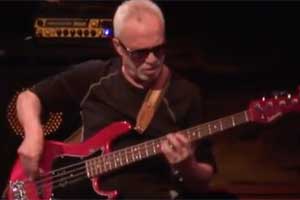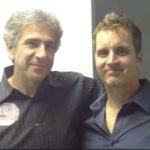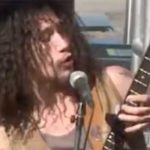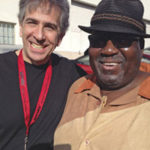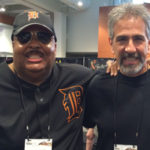NYC session heavyweight goes one-on-one with FBPO, covering everything from the Brecker Brothers to Letterman, with some invaluable advice for musicians!
Exclusive interview with FBPO’s Jon Liebman
September 26, 2011
Neil Jason is a professional bassist, producer and composer, born and raised in New York City. He has worked with John Lennon, Yoko Ono, Billy Joel, Roxy Music, Bryan Ferry, Hall & Oats, Mick Jagger, Pete Townsend, Charlie Watts, Carly Simon, Paul Simon, Kiss, Janis Ian, Harry Chapin, Debbie Harry, Joe Jackson, Michael Jackson, Diana Ross, Gladys Night, The Brecker Brothers, Bob James, David Sanborn, Celine Dion, John McLaughlin, Michael Franks, Cindy Lauper, Brigitte Zarie, Dire Straits, Eddie Van Halen and Luciano Pavorotti, to name a few.
Neil was a member of the Saturday Night Live house band from 1983 to 1985 and has made over a hundred appearances with Paul Shaffer’s band on The Late Show With David Letterman. He has also worked on countless hit commercials and movies as a composer in New York City.
FBPO: Tell me about your musical upbringing.
NJ: Well, I grew up in Brooklyn and, in the local school system, I ended up picking up trumpet in the sixth grade and it was a wonderful experience. I played in all the school bands, not just trumpet, but saxophone and trombone, too. Then I started taking piano lessons and learned a little bit more about music. I didn’t play bass until I was in high school.
FBPO: How did you end up a bass player?
I was a trumpet player and a singer in all of the local bands growing up and one of the bands I was in didn’t have a bass player. The keyboard player used to play bass with the left hand, with the chords. There were two songs they wanted a bass on. Luckily, the piano player had a bass his garage. One of the songs was “Knock On Wood.” He showed me how to play “Knock On Wood” with the open strings on the bass and I said, “You know, this is kind of interesting because I get to sing more songs if I play bass.” So I started practicing bass. With all the music lessons I had had on other instruments, the transition wasn’t that difficult and so I really started getting serious about playing bass during my last year in high school.
FBPO: Who were your influences as an up and coming bass player?
NJ: Well, back then, coming from the trumpet side, I had been listening to a lot of bands that had horns. I was listening to all the big horn bands, like Chase, Dreams, Chicago and stuff like that. I was very into Motown, but I really didn’t know I was listening to James Jamerson or Bob Babbitt or any of those guys in particular. I just loved the sound.
As I got more interested in bass, I became a Larry Graham fanatic! I would go see Sly Stone play, I don’t know, fifty times, just to watch Larry Graham play bass. And, you know, Bootsy and the guys in the James Brown band. Back then, I wasn’t really sure who some of these guys were, but I knew their records. Even the guys who played for Seals & Crofts. I would latch on to these strange bass players because they had a certain sound and they did a certain thing that other people didn’t do.
It was a very interesting way to learn how to play, by not just sticking to one style, but by getting interested in all the different guys and just trying to cop their styles. The things you try and cop when you’re young and not yet in the recording studio make you play a certain way because you don’t know how some of these things are done. I was very concerned about making noise on the fingerboard when I was younger because I never heard any noise on records while guys played bass. So I practiced a lot to play very clean. I didn’t realize until years and years and years later, until I was out of college, that in the recording studio you could get rid of some of that stuff. And it helped a lot! I didn’t have to get rid of a lot of stuff because I kind of had that sound when I played. It was just one of those little quirks that happens when you’re growing up listening to phonograph records, as opposed to MP3s. [Laughs!]
FBPO: Yep! I remember those days!
NJ: It sounded different back then. As I got older, once I got into college and I got more sophisticated, I started to listen to Miles Davis and Freddie Hubbard and guys like that. I got way into Ron Carter, Stanley Clarke and guys of that level. That’s also when I got into the jazz/fusion side that ended up with me being in the Brecker Brothers, who started that whole thing.
FBPO: You mentioned Ron and Stanley. Did you ever play upright?
NJ: I played upright for about five minutes! I really have an affinity for it, as far as I can tell, but it seemed to be much more advantageous to be an electric player than to be an upright player because of the style of music I was mostly playing at the time. I didn’t really need to be that versed in acoustic, so after about a year, I passed on playing acoustic. I had an Ampeg baby bass for a while, but I stayed electric and never went back.
FBPO: Tell me about that whole experience with the Brecker Brothers.
NJ: Playing in that band was like the beginning of my real career. Everything up till then kind of took me up to that point. I ended up taking over for Will Lee, who was the original bass player with the Breckers. He’s a very dear friend of mine.
FBPO: This was, when, around the mid ’70s?
NJ: I guess it was mid ’70s. I ended up playing with Michael and Randy and that turned into a couple tours and, I don’t know, two, three, four albums. Very exciting! Pretty much all of my fusion education came from Michael and Randy, living with them in their lofts and touring with them and learning about that style of music. They were amazing teachers and amazing players. I miss Michael tremendously.
FBPO: Tell me something about Michael.
NJ: All the accolades that Michael got are not even close to how he really was, as a person and as a player. His dedication to music was on such a high level. He taught me a lot about what I thought practicing was. I was probably practicing about six hours a day at that point, sometimes more. I had played on, I don’t know, maybe about ten albums by then, maybe even less. When I ran into these guys, not only were they touring and playing on sessions, but Michael, on our days off, spent the entire day, every day, just practicing. It was like a revelation to me that it never ends. So stop making believe like you’re there and get back to work, ’cause it doesn’t ever end. If somebody on that level is going to practice every day, then I need to practice even twice as much as that because I’m not on that level yet. Just watching them play and learning about the harmonic structures from those guys was an enormous education.
FBPO: That was the whole 7th Avenue South era, right?
NJ: Yes. It was just fantastic! I lived two blocks from 7th Avenue South and, in fact, I think for three or four years in a row, the Brecker Brothers and the Average White Band played the entire Christmas/New Year’s vacation, like eleven days in a row, every year, two shows a night. It was probably the most fun I ever had!
FBPO: I guess you could say you were at an advantage, having been born and raised in New York. If that weren’t the case, do you think you would have ended up there anyway?
NJ: I would think so. You know Michael and Randy and Will and all those guys all came from Florida. Steve Gadd and some of those guys went to college in the Midwest. But they all ended up in New York because the two main hubs of recording back then were New York and Los Angeles. So, if you wanted to be closer to the scene, the only way to know if you really were that good or if you could play on that level was to be the small fish in the big pond, to go jump in and see if you could do it.
I think wherever I had been educated and played, I would have eventually gravitated to New York because the amount of clubs in a square city block in one part of Manhattan is more than entire states in the Midwest. The ability to get to play live all the time and to meet all the people that gravitate to New York is an advantage to anybody. Being from New York, rather than trying to make the LA scene, I immersed myself in the New York City scene and it worked.
FBPO: But things are so different today than they were during the time when you were coming up. What advice do you have for the young, wannabe musicians with their sights set on “making it” in New York, LA, Nashville, etc?
NJ: Well, I guess it’s different because, back in the day, sessions were constant and the need for actual session-level players was extreme. Most albums used session players and there were just an incredible amount of recordings going on in the studios because there was really no place else to record back then. You had to go to a studio. There was no ProTools.
I still think, in the end, live playing is something that cannot be replaced anywhere by any machine or anybody. People still want to go out and see people play live. So if you’re in a place or a town or a situation where you can get to play in clubs and meet other people, it’s going to be an advantage. It’s the only way to find out if you’re on that level and to meet other guys that are on your level.
Obviously, you need to be prepared. You need to know your stuff. You need to practice like an animal. You need to be ready for the opportunity because you don’t know when it’s going to come. Part of being ready for the opportunity is understanding what it is you need to do to be successful. Some of the little things people tend to forget are things like showing up on time, paying attention to the producer, having your gear in perfect shape and having yourself in perfect shape. You can’t expect people to depend on you and pay you big money if you can’t do some of the simplest things. There are some players who are the greatest players in the world, but if they can’t show up on time, eventually, they find somebody who can. You have to pay attention to the little details and that will get you a lot further along the line than just proclaiming how great you are on your instrument!
FBPO: Great advice! Neil, you’re often spotted on the David Letterman show, filling in for Will Lee, who you mentioned earlier. I think I’ve even caught you singing “East River” with that band.
NJ: Yes, you have!
FBPO: Tell me about working with Paul Shaffer and Anton Fig and the rest of that band.
NJ: It’s a wonderful experience! I’ve been subbing for Will for probably twenty-four years, since the beginning of the show. I’m great old friends with Paul and with everybody who’s in the band and who has ever been in the band, from the beginning. So, I’m honored by both Paul and Will to be called as a sub whenever Will isn’t able to be there. And Paul is the consummate bandleader! He knows his stuff backwards, forwards and upside down. Obviously, it’s easier for me to sound really good when I get to play with somebody like Anton and, at the beginning of the Letterman show, when I got to play with Steve Jordan. When you’ve got guys who can lay it down that thick, you don’t have to work too hard. You just have to pay attention.
FBPO: What’s keeping you busy these days, Neil?
NJ: Thank goodness, a lot of things! I was privileged to play with a lot of different people this summer. I got to play with Bette Midler, Paul Simon, Ted Nugent, Jennifer Batten. I’ve been playing some Les Paul Monday nights at the Iridium and right now I’m in the midst of producing the second CD for Brigitte Zarie. I’m also the head of artist relations for Guitar Center, here in New York City.
FBPO: What lies ahead for you and your career? What else would you like to accomplish that you haven’t done yet?
NJ: Everything! [Laughs!]
FBPO: Well, that narrows it down!
NJ: Like I said before, I don’t think it ever ends. There’s always somebody else that I’d love to play with. There’s always somebody new that I don’t even know that I might get a chance to play with and go, “Oh my God! This guy is amazing!” It’s always a thrill to meet new musicians. It’s always a thrill to play with new musicians and just get together. We played at the Iridium the other night. I played with Danny Kortchmar, a great guitar player, “Kootch.” It’s just wonderful to still be able to go out and make it happen, to get in a groove and play with the best guys. I’m hoping that this continues for, well, possibly forever. If I can continue to write and produce and enjoy myself, as long as I stay in shape and keep my chops up, I don’t see any limits to how long I can keep playing. And I intend to keep playing as long as I can.
FBPO: What would you be if you weren’t a bass player/producer/composer?
NJ: Unhappy! I can’t think of anything that completes me as much as being in the world of music.
